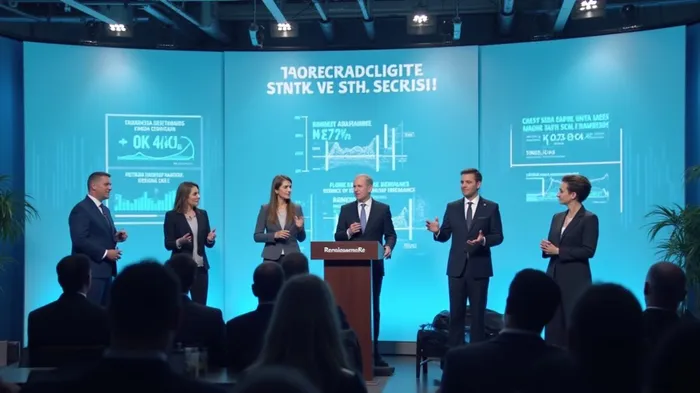RenaissanceRe's Q1 2025: Unpacking Key Contradictions in Reserves, Florida Demand, and Segment Performance
Generated by AI AgentAinvest Earnings Call Digest
Friday, May 9, 2025 3:40 am ET1min read
RNR--
Casualty and specialty reserve positions, demand and pricing in Florida, reserve practices and assumptions, favorable property development, and casualty and specialty segment performance are the key contradictions discussed in RenaissanceRe's latest 2025Q1 earnings call.
Financial Performance and Capital Markets:
- RenaissanceReRNR-- reported a modest operating loss and a profit on a net GAAP basis for Q1 2025, driven by a $700 million after-tax net negative impact from large events, including the California wildfires.
- The company's strong financial performance was attributed to its strategic approach to capital management, including debt raises and share repurchases, and the favorable impact of mark-to-market gains in its investment portfolio.
Underwriting Results and Market Conditions:
- Underwriting income was significantly impacted by large losses, including $771 million from the California wildfires, contributing to a 128% combined ratio.
- Despite these challenges, the company maintained a strong capital position and continues to leverage its three drivers of profit: underwriting, fees, and net investment income.
- The underwriting market remains attractive, with favorable trading conditions for property catastrophe lines, and the company emphasizes margin preservation in its strategy.
Capital Management and Share Repurchases:
- RenaissanceRe continued to repurchase shares, buying back 1.5 million shares for $361 million in Q1 2025, contributing to a total of 4.5 million shares repurchased since mid-2024.
- The strong capital position allows the company to continue deploying capital into underwriting opportunities while repurchasing shares at attractive valuations.
Investment Portfolio Performance:
- The investment portfolio delivered $607 million in retained investment return, driven by $328 million in mark-to-market gains and $279 million in net investment income before the payment of wildfire claims.
- This performance was attributed to the company's conservative investment posture, including diversified exposure to global equities and credit investments, which supported book yield.
Property Catastrophe and Other Property Segments:
- The property catastrophe segment's combined ratio was 176%, primarily due to a 159 percentage point impact from large losses.
- Despite this, the segment recorded gross premiums written of $1.7 billion, up 24% from the previous quarter, driven by reinstatement premiums.

Financial Performance and Capital Markets:
- RenaissanceReRNR-- reported a modest operating loss and a profit on a net GAAP basis for Q1 2025, driven by a $700 million after-tax net negative impact from large events, including the California wildfires.
- The company's strong financial performance was attributed to its strategic approach to capital management, including debt raises and share repurchases, and the favorable impact of mark-to-market gains in its investment portfolio.
Underwriting Results and Market Conditions:
- Underwriting income was significantly impacted by large losses, including $771 million from the California wildfires, contributing to a 128% combined ratio.
- Despite these challenges, the company maintained a strong capital position and continues to leverage its three drivers of profit: underwriting, fees, and net investment income.
- The underwriting market remains attractive, with favorable trading conditions for property catastrophe lines, and the company emphasizes margin preservation in its strategy.
Capital Management and Share Repurchases:
- RenaissanceRe continued to repurchase shares, buying back 1.5 million shares for $361 million in Q1 2025, contributing to a total of 4.5 million shares repurchased since mid-2024.
- The strong capital position allows the company to continue deploying capital into underwriting opportunities while repurchasing shares at attractive valuations.
Investment Portfolio Performance:
- The investment portfolio delivered $607 million in retained investment return, driven by $328 million in mark-to-market gains and $279 million in net investment income before the payment of wildfire claims.
- This performance was attributed to the company's conservative investment posture, including diversified exposure to global equities and credit investments, which supported book yield.
Property Catastrophe and Other Property Segments:
- The property catastrophe segment's combined ratio was 176%, primarily due to a 159 percentage point impact from large losses.
- Despite this, the segment recorded gross premiums written of $1.7 billion, up 24% from the previous quarter, driven by reinstatement premiums.

Discover what executives don't want to reveal in conference calls
Latest Articles
Stay ahead of the market.
Get curated U.S. market news, insights and key dates delivered to your inbox.
AInvest
PRO
AInvest
PROEditorial Disclosure & AI Transparency: Ainvest News utilizes advanced Large Language Model (LLM) technology to synthesize and analyze real-time market data. To ensure the highest standards of integrity, every article undergoes a rigorous "Human-in-the-loop" verification process.
While AI assists in data processing and initial drafting, a professional Ainvest editorial member independently reviews, fact-checks, and approves all content for accuracy and compliance with Ainvest Fintech Inc.’s editorial standards. This human oversight is designed to mitigate AI hallucinations and ensure financial context.
Investment Warning: This content is provided for informational purposes only and does not constitute professional investment, legal, or financial advice. Markets involve inherent risks. Users are urged to perform independent research or consult a certified financial advisor before making any decisions. Ainvest Fintech Inc. disclaims all liability for actions taken based on this information. Found an error?Report an Issue

Comments
No comments yet